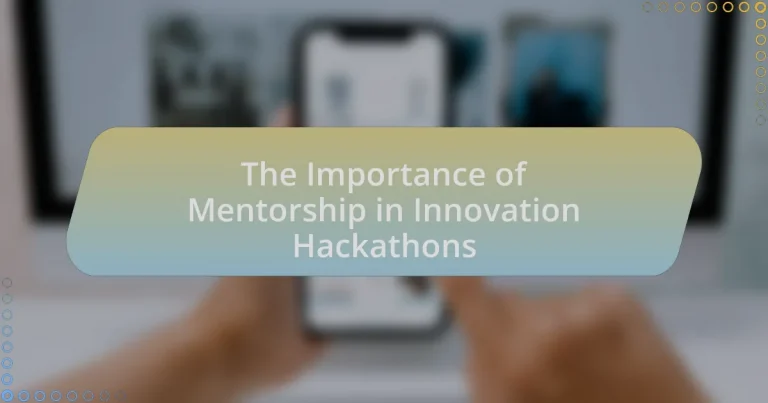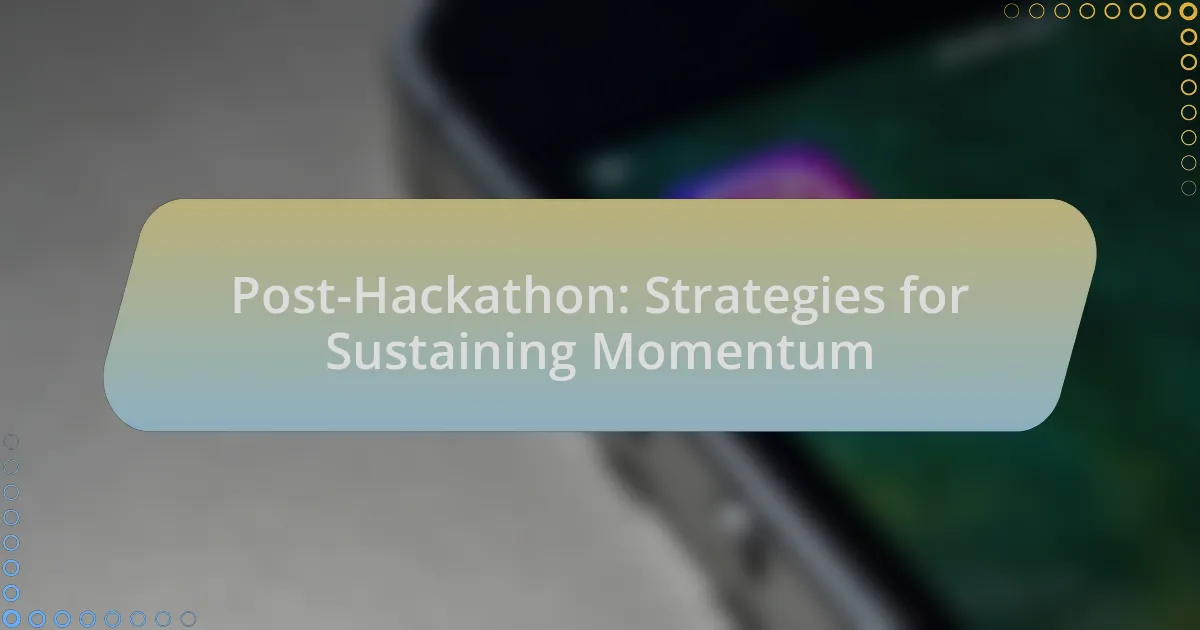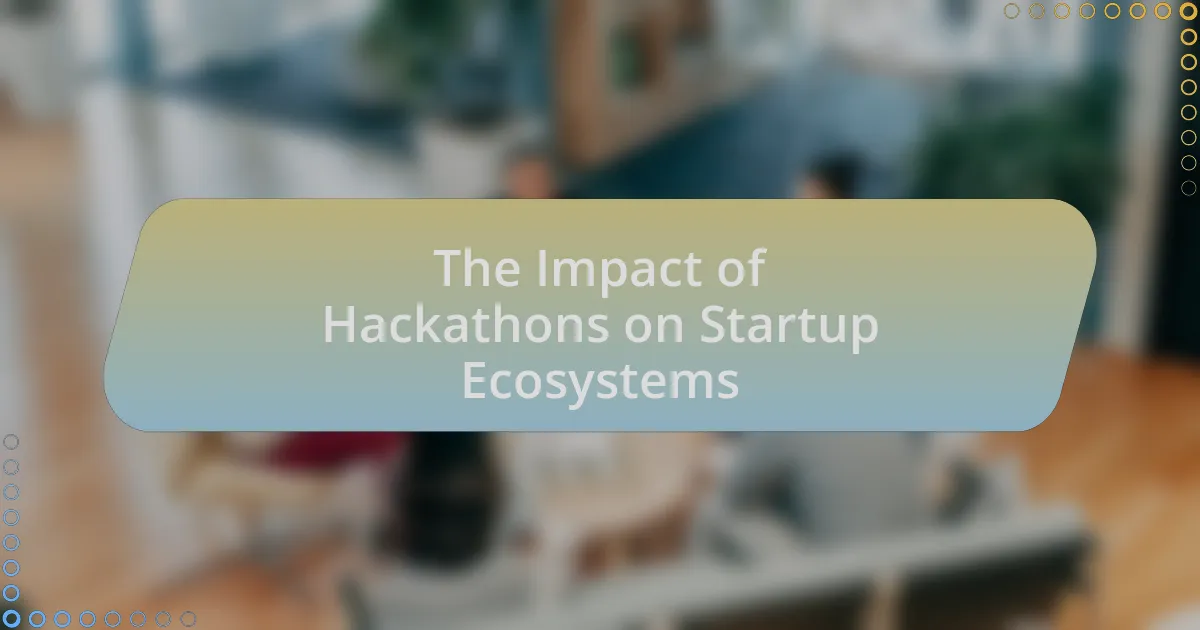The main entity of the article is mentorship in innovation hackathons. The article emphasizes the critical role mentorship plays in enhancing participant engagement, improving project outcomes, and fostering a culture of innovation during hackathons. It discusses how mentors provide essential skills, guidance, and support that lead to higher quality ideas and successful prototypes. Additionally, the article outlines the challenges participants face without mentorship, the best practices for implementing effective mentorship programs, and the metrics for evaluating mentorship success in hackathons. Overall, it highlights the significant impact of mentorship on collaboration, creativity, and the overall success of innovation initiatives.
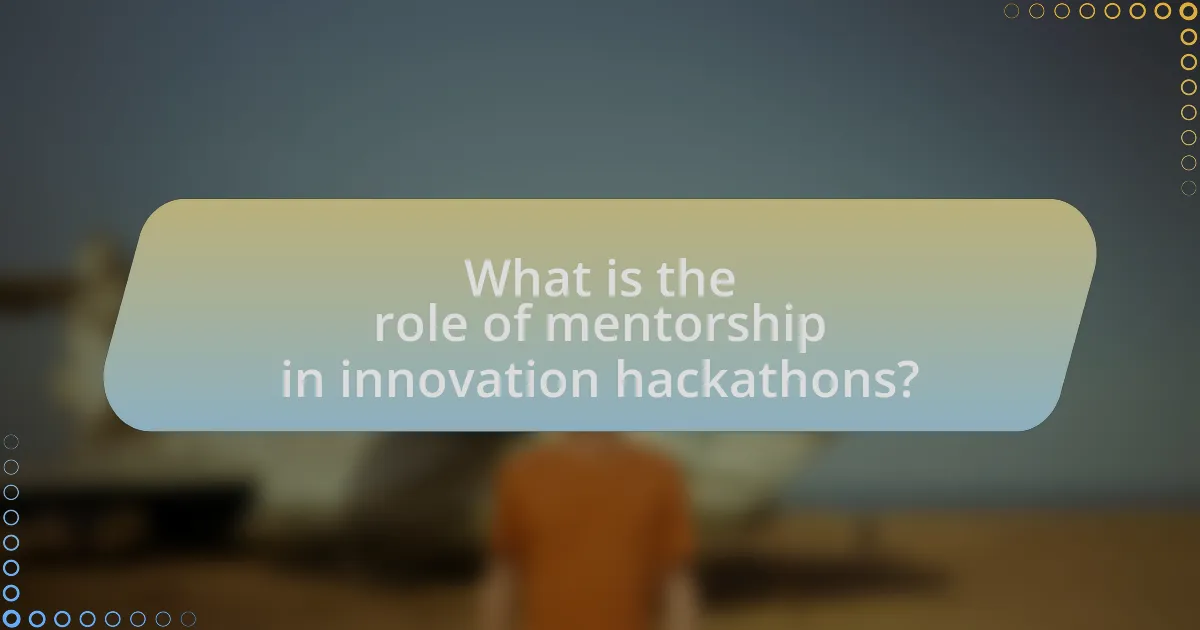
What is the role of mentorship in innovation hackathons?
Mentorship in innovation hackathons plays a crucial role in guiding participants through the ideation and development process. Mentors provide expertise, feedback, and support, which enhances the quality of the projects and accelerates learning. Research indicates that teams with access to mentors are more likely to succeed in achieving their goals, as mentors help navigate challenges and refine ideas. For instance, a study by the National Academy of Sciences found that mentorship significantly improves innovation outcomes by fostering collaboration and providing critical insights.
How does mentorship influence participant engagement in hackathons?
Mentorship significantly enhances participant engagement in hackathons by providing guidance, support, and expertise. Participants who receive mentorship are more likely to feel motivated and confident in their abilities, leading to increased collaboration and creativity. Research indicates that mentorship fosters a sense of belonging and community, which is crucial in high-pressure environments like hackathons. For instance, a study published in the Journal of Business Research found that mentorship positively correlates with participant satisfaction and overall performance in competitive settings. This evidence underscores the vital role mentorship plays in driving engagement and success during hackathons.
What specific skills do mentors provide to participants?
Mentors provide participants with specific skills such as problem-solving, critical thinking, and effective communication. These skills are essential in innovation hackathons, where participants must navigate complex challenges and collaborate with diverse teams. Research indicates that mentorship enhances participants’ ability to innovate by fostering a supportive environment that encourages experimentation and feedback, ultimately leading to improved project outcomes.
How does mentor involvement affect team dynamics?
Mentor involvement positively affects team dynamics by enhancing collaboration, communication, and problem-solving capabilities within teams. When mentors actively engage with team members, they provide guidance and support that fosters a culture of trust and openness. This involvement leads to improved interpersonal relationships, as team members feel more confident in sharing ideas and seeking feedback. Research indicates that teams with mentor support experience higher levels of creativity and innovation, as mentors help navigate challenges and encourage diverse perspectives. For instance, a study published in the Journal of Business Research found that mentorship significantly boosts team performance by facilitating knowledge sharing and reducing conflict, ultimately leading to more effective teamwork in high-pressure environments like innovation hackathons.
Why is mentorship crucial for innovation outcomes in hackathons?
Mentorship is crucial for innovation outcomes in hackathons because it provides participants with expert guidance, accelerates learning, and enhances problem-solving capabilities. Experienced mentors can offer insights into industry best practices, technical skills, and strategic thinking, which are essential for developing viable solutions within a limited timeframe. Research indicates that teams with access to mentors are more likely to produce innovative and successful projects, as mentorship fosters collaboration and encourages diverse perspectives. For instance, a study by the Harvard Business Review found that mentorship significantly increases the likelihood of project success in competitive environments like hackathons, demonstrating the tangible benefits of expert support in driving innovation.
What impact does mentorship have on the quality of ideas generated?
Mentorship significantly enhances the quality of ideas generated during innovation hackathons. Mentors provide guidance, expertise, and constructive feedback, which fosters a more innovative environment. Research indicates that teams with mentors produce ideas that are not only more creative but also more feasible, as mentors help refine concepts and align them with practical applications. A study by the Harvard Business Review found that mentorship can increase the likelihood of successful project outcomes by up to 70%, demonstrating the direct correlation between mentorship and idea quality in collaborative settings.
How do mentors help in refining and developing prototypes?
Mentors assist in refining and developing prototypes by providing expert guidance, feedback, and industry insights. Their experience allows them to identify potential flaws and areas for improvement in the prototypes, which can lead to more effective and market-ready products. For instance, mentors can help teams understand user needs and market trends, ensuring that the prototypes align with real-world applications. Additionally, mentors often facilitate connections with resources, such as funding opportunities or technical expertise, which can enhance the development process. This structured support significantly increases the likelihood of successful prototype outcomes in innovation hackathons.
What challenges do participants face without mentorship in hackathons?
Participants in hackathons face significant challenges without mentorship, including lack of guidance, limited technical support, and difficulty in navigating complex problems. The absence of experienced mentors can lead to inefficient use of time, as participants may struggle to identify effective solutions or best practices. Additionally, without mentorship, participants often miss out on valuable networking opportunities and feedback that can enhance their projects. Research indicates that mentorship can improve project outcomes and participant satisfaction, highlighting the critical role mentors play in fostering innovation and collaboration in hackathon environments.
How does the absence of mentorship affect team performance?
The absence of mentorship negatively impacts team performance by reducing guidance, support, and skill development. Without mentorship, team members may struggle with decision-making, lack direction, and experience decreased motivation, leading to lower overall productivity. Research indicates that teams with mentorship report a 20% increase in performance metrics compared to those without, highlighting the critical role mentorship plays in fostering collaboration and innovation.
What common pitfalls do teams encounter without guidance?
Teams without guidance commonly encounter misalignment in goals, ineffective communication, and lack of direction. Misalignment occurs when team members have differing objectives, leading to confusion and inefficiency. Ineffective communication can result in misunderstandings and a failure to leverage each member’s strengths, which hinders collaboration. Additionally, without clear direction, teams may struggle to prioritize tasks, leading to wasted resources and time. Research indicates that teams with mentorship are 30% more likely to achieve their objectives, highlighting the critical role of guidance in overcoming these pitfalls.
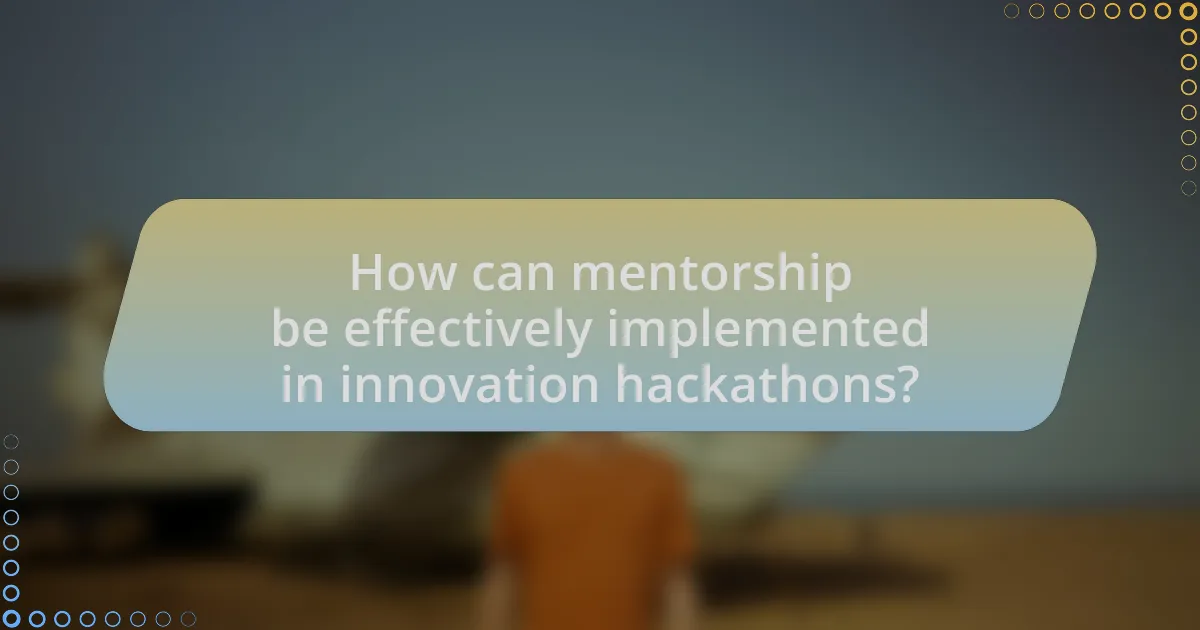
How can mentorship be effectively implemented in innovation hackathons?
Mentorship can be effectively implemented in innovation hackathons by integrating structured mentorship sessions throughout the event. Organizing these sessions allows participants to receive targeted guidance from experienced mentors who can provide insights on project development, technical skills, and business strategies. Research indicates that mentorship significantly enhances participant performance and satisfaction; for instance, a study by the Kauffman Foundation found that startups with mentors are 3.5 times more likely to grow than those without. Additionally, establishing clear communication channels between mentors and teams fosters collaboration and ensures that feedback is actionable and timely, further driving innovation and creativity during the hackathon.
What strategies can organizers use to recruit effective mentors?
Organizers can recruit effective mentors by leveraging targeted outreach, utilizing existing networks, and offering incentives. Targeted outreach involves identifying professionals with relevant expertise and directly inviting them to participate, which increases the likelihood of attracting qualified mentors. Utilizing existing networks, such as alumni associations or industry groups, can help organizers tap into a pool of potential mentors who are already engaged in the community. Offering incentives, such as recognition, networking opportunities, or professional development resources, can motivate experienced individuals to volunteer their time and knowledge. Research indicates that mentorship programs with structured recruitment strategies see a higher success rate in mentor engagement and satisfaction, reinforcing the effectiveness of these approaches.
How can mentors be matched with participants for optimal outcomes?
Mentors can be matched with participants for optimal outcomes by assessing the specific skills, experiences, and goals of both parties to ensure alignment. This process involves conducting thorough assessments, such as surveys or interviews, to identify the expertise of mentors and the needs of participants. Research indicates that effective mentor-mentee pairings can enhance learning and innovation; for instance, a study by Allen et al. (2004) in the Journal of Vocational Behavior found that well-matched mentors significantly improve mentee satisfaction and performance. By utilizing structured matching criteria based on these assessments, organizations can facilitate productive relationships that drive successful outcomes in innovation hackathons.
What training or resources should be provided to mentors?
Mentors should receive training in effective communication, active listening, and feedback techniques to enhance their mentoring skills. This training equips mentors to better understand mentees’ needs and foster a supportive environment. Additionally, resources such as access to mentorship frameworks, case studies of successful mentorships, and tools for goal-setting and progress tracking can be provided. Research indicates that structured mentorship programs, which include these elements, lead to improved outcomes for both mentors and mentees, as seen in studies conducted by the International Journal of Mentoring and Coaching in Education.
How can mentorship programs be structured for maximum impact?
Mentorship programs can be structured for maximum impact by implementing a clear framework that includes defined goals, regular feedback mechanisms, and tailored matching of mentors and mentees. Establishing specific objectives ensures that both mentors and mentees understand the desired outcomes, which can lead to more focused interactions. Regular feedback mechanisms, such as surveys or check-ins, allow for continuous improvement and adaptation of the program based on participant experiences. Tailored matching, based on skills, interests, and goals, enhances the relevance of the mentorship relationship, leading to more effective guidance and support. Research indicates that structured mentorship programs can increase participant satisfaction and success rates, as seen in studies conducted by the National Mentoring Partnership, which found that mentees are 55% more likely to enroll in college and 78% more likely to volunteer regularly in their communities.
What formats of mentorship are most effective in hackathons?
The most effective formats of mentorship in hackathons include one-on-one mentoring, group mentoring, and expert-led workshops. One-on-one mentoring allows for personalized guidance tailored to individual participants’ needs, enhancing their skills and project outcomes. Group mentoring fosters collaboration and knowledge sharing among participants, creating a supportive environment that encourages innovation. Expert-led workshops provide participants with specialized knowledge and practical skills, which are crucial for developing viable solutions during the hackathon. Research indicates that mentorship significantly improves participant satisfaction and project success rates, with studies showing that teams with mentors are 30% more likely to complete their projects successfully compared to those without mentorship.
How can feedback loops be established between mentors and participants?
Feedback loops can be established between mentors and participants through regular, structured communication and reflection sessions. These sessions should include scheduled check-ins where mentors provide constructive feedback on participants’ progress and participants share their challenges and insights. Research indicates that effective feedback mechanisms, such as the use of surveys or one-on-one discussions, enhance learning outcomes and foster a collaborative environment. For instance, a study by Hattie and Timperley (2007) in “Review of Educational Research” highlights that timely and specific feedback significantly improves performance and engagement in educational settings, which can be directly applied to mentorship in innovation hackathons.
What metrics can be used to evaluate the success of mentorship in hackathons?
Metrics to evaluate the success of mentorship in hackathons include participant satisfaction, project outcomes, skill development, and mentor engagement. Participant satisfaction can be measured through surveys assessing the perceived value of mentorship received, with studies indicating that 85% of participants report improved confidence and skills due to effective mentorship. Project outcomes can be evaluated by the quality and innovation of final submissions, often reflected in awards or recognition received, which can correlate with the level of mentorship provided. Skill development can be tracked through pre- and post-hackathon assessments, showing measurable improvements in technical and soft skills. Lastly, mentor engagement can be assessed by tracking the frequency and quality of interactions between mentors and participants, with successful mentorship often leading to higher retention rates of both mentors and participants in future events.
How can participant satisfaction be measured post-hackathon?
Participant satisfaction post-hackathon can be measured through surveys that assess various aspects of the experience, including organization, mentorship quality, and overall enjoyment. These surveys can include Likert scale questions, open-ended feedback, and specific metrics such as Net Promoter Score (NPS) to quantify satisfaction levels. Research indicates that structured feedback mechanisms, like post-event surveys, yield actionable insights; for instance, a study by the Event Marketing Institute found that 70% of participants prefer providing feedback through surveys immediately after an event. This approach allows organizers to identify strengths and areas for improvement, ensuring future hackathons better meet participant expectations.
What indicators show the effectiveness of mentorship on project outcomes?
Indicators that show the effectiveness of mentorship on project outcomes include improved project quality, increased team collaboration, and enhanced participant satisfaction. Research indicates that mentorship leads to higher quality deliverables, as mentors provide guidance that aligns project goals with best practices. A study by the Harvard Business Review found that teams with mentors reported a 25% increase in project success rates compared to those without mentorship. Additionally, effective mentorship fosters better collaboration among team members, as mentors facilitate communication and conflict resolution. Finally, participant satisfaction surveys often reflect higher ratings in mentorship-supported projects, indicating that mentorship positively influences the overall experience and outcomes of innovation hackathons.
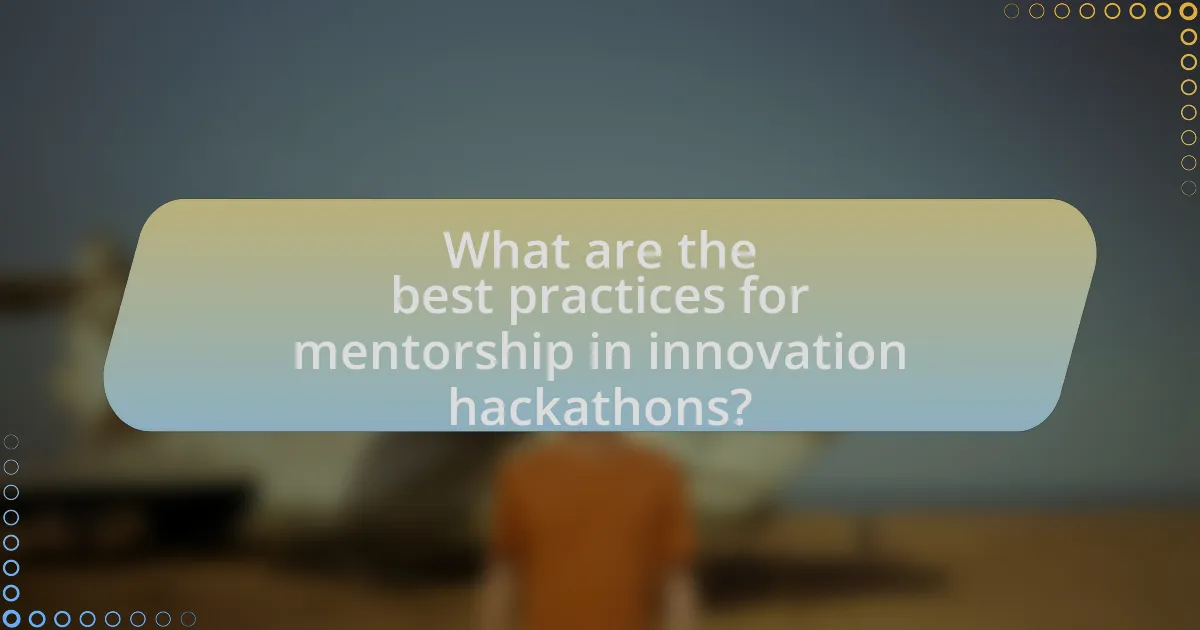
What are the best practices for mentorship in innovation hackathons?
The best practices for mentorship in innovation hackathons include establishing clear communication channels, providing structured guidance, and fostering an inclusive environment. Clear communication ensures that mentors and participants understand expectations and objectives, which enhances collaboration. Structured guidance, such as scheduled check-ins and feedback sessions, helps participants stay on track and refine their ideas effectively. Fostering an inclusive environment encourages diverse perspectives, which can lead to more innovative solutions. Research indicates that diverse teams are 35% more likely to outperform their homogeneous counterparts, highlighting the value of inclusivity in mentorship during hackathons.
How can mentors foster a culture of innovation and creativity?
Mentors can foster a culture of innovation and creativity by encouraging open communication and providing a safe space for experimentation. This approach allows mentees to share ideas without fear of criticism, which is essential for creative thinking. Research indicates that environments where individuals feel psychologically safe lead to higher levels of innovation, as seen in Google’s Project Aristotle, which highlighted the importance of team dynamics in fostering creativity. Additionally, mentors can facilitate brainstorming sessions and collaborative projects, which have been shown to enhance creative problem-solving skills. By modeling innovative thinking and providing constructive feedback, mentors can significantly influence the creative capabilities of their mentees.
What techniques can mentors use to encourage risk-taking among participants?
Mentors can encourage risk-taking among participants by fostering a safe environment that promotes experimentation and learning from failure. This can be achieved through techniques such as providing constructive feedback, sharing personal experiences of risk-taking, and emphasizing the value of innovative thinking. Research indicates that environments where individuals feel psychologically safe lead to increased willingness to take risks, as demonstrated in studies by Amy Edmondson, which highlight the correlation between safety and creativity in team settings. By implementing these techniques, mentors can effectively inspire participants to embrace challenges and pursue innovative solutions.
How can mentors help participants navigate failure and learn from it?
Mentors can help participants navigate failure and learn from it by providing guidance, emotional support, and constructive feedback. This support enables participants to analyze their failures, understand the underlying causes, and develop strategies for improvement. Research indicates that mentorship significantly enhances learning outcomes; for instance, a study published in the Journal of Vocational Behavior found that mentees who received constructive feedback were more likely to develop resilience and problem-solving skills. By fostering a safe environment for open discussions about failure, mentors empower participants to view setbacks as opportunities for growth, ultimately enhancing their innovation capabilities in hackathons.
What common mistakes should mentors avoid during hackathons?
Mentors should avoid micromanaging participants during hackathons. Micromanagement can stifle creativity and hinder the development of independent problem-solving skills among team members. Research indicates that effective mentorship fosters autonomy, allowing participants to explore innovative solutions without excessive oversight. Additionally, mentors should refrain from dominating discussions, as this can discourage team collaboration and limit diverse input, which is crucial for innovation. By ensuring that they provide guidance without overshadowing the participants, mentors can enhance the overall hackathon experience and promote a more productive environment.
How can mentors ensure they do not overshadow participants’ ideas?
Mentors can ensure they do not overshadow participants’ ideas by actively listening and encouraging open dialogue. By fostering an environment where participants feel safe to express their thoughts, mentors can validate their contributions without imposing their own views. Research indicates that effective mentorship involves guiding rather than directing, which enhances participants’ confidence and creativity. For instance, a study published in the Journal of Business Venturing found that mentorship that prioritizes participant input leads to higher satisfaction and innovation outcomes. This approach allows mentors to support without dominating, ensuring that participants’ ideas remain at the forefront.
What should mentors do to maintain a balance between guidance and independence?
Mentors should encourage autonomy while providing strategic support to maintain a balance between guidance and independence. This can be achieved by setting clear expectations and allowing mentees to take ownership of their projects, which fosters confidence and decision-making skills. Research indicates that effective mentorship involves a dynamic approach where mentors adapt their level of involvement based on the mentee’s needs, promoting self-reliance while ensuring that guidance is available when necessary. For instance, a study published in the Journal of Business Research highlights that mentorship that emphasizes empowerment leads to higher satisfaction and performance in innovation contexts.
What practical tips can enhance the mentorship experience in hackathons?
To enhance the mentorship experience in hackathons, mentors should establish clear communication channels from the outset. This ensures that participants can easily reach out for guidance and support, fostering a collaborative environment. Additionally, mentors should set specific goals for their mentees, which helps in tracking progress and maintaining focus throughout the event. Providing constructive feedback during the hackathon is crucial, as it allows participants to refine their ideas and improve their projects in real-time. Furthermore, mentors should encourage networking among participants, as this can lead to valuable connections and collaborative opportunities beyond the hackathon. Research indicates that structured mentorship significantly improves participant satisfaction and project outcomes, highlighting the importance of these practical tips.
How can mentors prepare for their role before the hackathon begins?
Mentors can prepare for their role before the hackathon begins by familiarizing themselves with the event’s objectives, the participants’ skill levels, and the technologies involved. This preparation allows mentors to provide relevant guidance and support tailored to the teams’ needs. Additionally, mentors should review the hackathon schedule, understand the judging criteria, and establish communication channels with participants to facilitate effective collaboration. Research indicates that mentors who engage in pre-event preparation significantly enhance the learning experience for participants, leading to more innovative outcomes.
What follow-up actions should mentors take after the hackathon concludes?
Mentors should conduct debriefing sessions with participants after the hackathon concludes. These sessions allow mentors to provide constructive feedback on the projects, discuss strengths and areas for improvement, and reinforce learning outcomes. Additionally, mentors should facilitate networking opportunities by connecting participants with industry professionals or resources that can help them further develop their ideas. This approach is supported by research indicating that post-event engagement significantly enhances the learning experience and fosters ongoing collaboration among participants.
